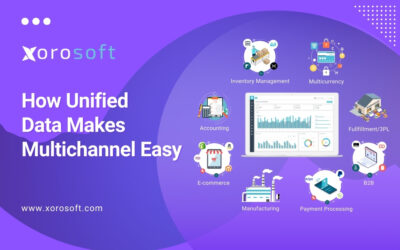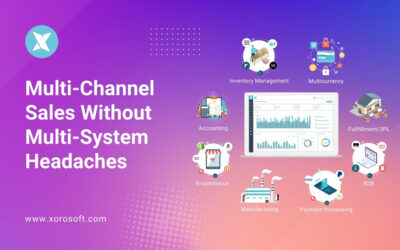
In today’s digital age, businesses of all sizes need to maximize efficiency to stay competitive. An Enterprise Resource Planning (ERP) system is a powerful tool that can help ecommerce companies save time and money, improve accuracy of operations, and increase customer satisfaction. In this article, we’ll provide an overview of what an ERP system is and the benefits it can offer to ecommerce companies. we’ll also explore the features and capabilities of ERP systems, the software vendors offering them, and the process of integrating an ERP system with ecommerce platforms such as Shopify, BigCommerce, Woocommerce and many more. Finally, we’ll discuss ERP system’s usage for inventory management, manufacturing capabilities, analytics, and implementation.
What is an ERP System?
An ERP system is an integrated system of software applications designed to automate and optimize the core business processes of a company. It is a comprehensive solution that enables companies to manage their entire enterprise, from customer relationships to financials to supply chain operations, in one unified platform. ERP systems provide companies with visibility and control over their operations, enabling them to make informed decisions, boost efficiency, and improve customer service.
An ERP system is a powerful tool for eCommerce companies, as it can help them streamline their operations and manage a wide range of business processes. It can also provide customers with a better shopping experience, as it can help companies ensure accurate product availability and quick order fulfillment.
Benefits of an ERP System for ecommerce companies
Ecommerce companies can reap a number of benefits by implementing an ERP system. First and foremost, it can help them save time and money, as it streamlines and automates core business processes such as order processing, inventory management, and customer service. This can lead to improved operational efficiency, and in turn, improved customer satisfaction.
An ERP system can also help ecommerce companies gain greater visibility and control over their operations. By integrating the system with existing business applications, companies can gain access to real-time data and analytics, enabling them to make informed decisions and take proactive measures. This can help them identify and address problems quickly and efficiently, leading to improved customer service.
Finally, an ERP system can help ecommerce companies manage their inventory and order fulfillment more effectively. By automating inventory management, companies can ensure that products are always in stock and can be shipped quickly. This can lead to increased customer satisfaction and improved sales.
ERP System features and capabilities
ERP systems offer a wide range of features and capabilities to help ecommerce companies manage their operations. These include:
- Customer Relationship Management (CRM): ERP systems can help companies manage customer relationships by collecting customer data, tracking sales, and managing customer service.
- Financial Management: ERP systems can help companies manage their finances, including accounts payable and receivable, budgeting, and forecasting.
- Supply Chain Management: ERP systems can help companies manage their supply chain operations, such as inventory management, order processing, and logistics.
- Manufacturing: ERP systems can help companies manage manufacturing processes, such as planning, scheduling, and production.
- Analytics: ERP systems can provide companies with real-time data and analytics, enabling them to monitor their operations and make informed decisions.
ERP System software vendors, such as Xorosoft
There are a number of software vendors offering ERP systems, such as Xorosoft. Xorosoft is a comprehensive ERP solution that provides companies with an integrated platform for managing their core business processes. It offers a range of features, including customer relationship management, financial management, supply chain management, manufacturing, and analytics.
Xorosoft is designed to be user-friendly and easy to implement. It also provides customers with customer support and training services. Additionally, Xorosoft offers various customization options, allowing companies to tailor the system to their specific needs.
Integrating an ERP System with ecommerce platforms, such as Shopify
Integrating an ERP system with an ecommerce platform, such as Shopify, can help ecommerce companies automate and streamline their operations. By connecting the two systems, companies can sync customer data, manage orders, and track inventory in real time. This can lead to improved accuracy of operations, faster order fulfillment, and improved customer satisfaction.
Integrating an ERP system with an ecommerce platform can also help companies manage their finances more effectively. By connecting the two systems, companies can automate financial processes, such as accounts receivable and payable, budgeting, and forecasting.
ERP System for inventory management
An ERP system can help ecommerce companies manage their inventory more effectively. By automating the process, companies can ensure that products are always in stock and can be shipped quickly. This can lead to increased customer satisfaction and improved sales.
An ERP system can also help companies track and monitor inventory in real time. This can help them identify and address problems quickly and efficiently, leading to improved customer service. Additionally, an ERP system can help companies manage returns and order cancellations, as well as keep track of backorders and out-of-stocks.
ERP System for manufacturing
An ERP system can help companies manage their manufacturing processes more effectively. It can help companies plan, schedule, and track production in real time, enabling them to optimize the process and reduce costs. Additionally, an ERP system can help companies manage quality assurance processes, ensuring that products meet the highest standards.
An ERP system can also help companies manage their supply chain operations more effectively. It can help companies track orders and shipments in real time, enabling them to identify and address issues quickly and efficiently. This can lead to improved customer service and increased customer satisfaction.
ERP System for analytics
An ERP system can provide companies with real-time data and analytics, enabling them to monitor their operations and make informed decisions. This can help companies identify opportunities for improvement, optimize their processes, and reduce costs. Additionally, an ERP system can help companies gain insights into customer behavior, enabling them to better understand their target market and customize their offerings accordingly.
ERP System implementation process
Implementing an ERP system can be a complex process, as it involves integrating the system with existing business applications. It is important to ensure that the system is configured correctly and that it meets the company’s specific needs. Additionally, it is important to ensure that the system is properly tested and that staff are adequately trained.
Fortunately, most ERP vendors offer professional services to help companies implement the system. These services typically include custom configuration, training, and support. Additionally, some vendors offer cloud-based solutions, which can be implemented quickly and easily.
Conclusion
An ERP system can provide ecommerce companies with a wealth of benefits, from improved operational efficiency to increased customer satisfaction. It can help companies automate and streamline their operations, manage their finances, and gain insights into customer behavior. Additionally, it can be integrated with ecommerce platforms such as Shopify, enabling companies to sync customer data, manage orders, and track inventory in real time.
If you’re looking to unlock the power of an ERP system, Xorosoft is a great option. It offers a comprehensive solution with a range of features, including customer relationship management, financial management, supply chain management, manufacturing, and analytics. It is also easy to implement and customize, and offers customer support and training services.
By taking advantage of an ERP system, ecommerce companies can save time and money, improve accuracy of operations, and increase customer satisfaction. So, if you’re looking to maximize efficiency and stay competitive, an ERP system is the way to go!









